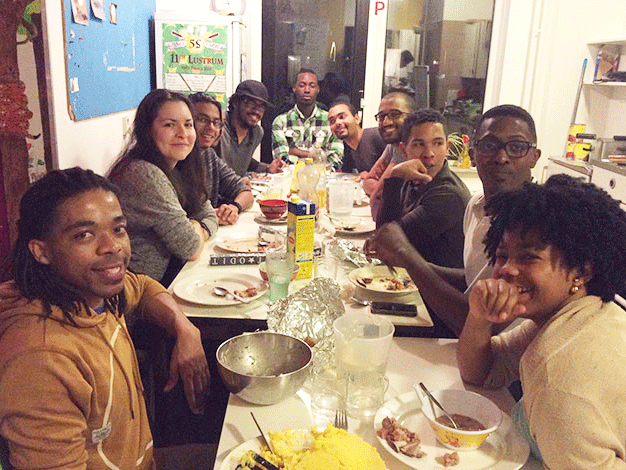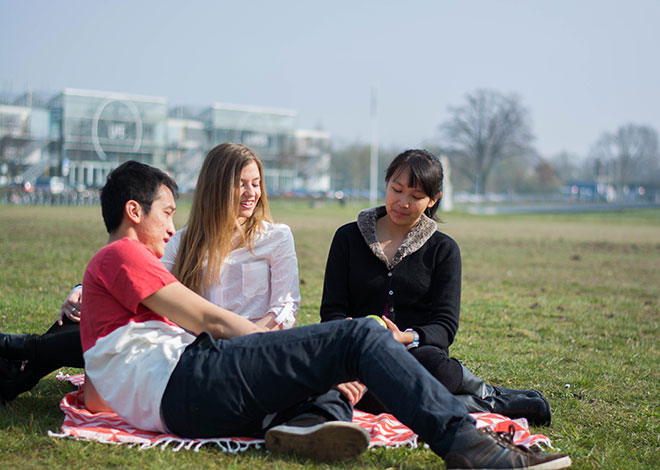Studying abroad, experiences from Curaçao
Studying abroad is something that many (prospective) students want to do. What is it like to study abroad? Does your son or daughter have plans to study abroad? Learn from the experiences of students from Curaçao. (Dutch version, in het Nederlands)

What is it like to study abroad? Does your son or daughter have plans to study abroad? Learn from the experiences of students from Curaçao.
Studying abroad
At this table, you see a group of students from Curaçao and Aruba. They regularly eat together here in the kitchen of the student flat. On the table, there are various dishes from their country. My question for them: “What is it like, studying abroad?” What tips and tricks would you pass on to other students (and their parents) who want to study abroad?
You learn a lot in a short time
Corinne: “Of course, I ensure I was thoroughly prepared for studying abroad. That was also fun to do. I read a lot about the Netherlands, watched Dutch television, and already had friends and family in the Netherlands. I felt that I was well prepared for the new culture in which I was going to live for a few years. However, there were still surprises.” How so? “I found it really strange that the lecturers here address you by your first name and that you can just ask questions. That you don’t have to agree with important people and that sometimes they even like when you don’t agree with them and engage in discussion about it. Dutch people don’t realise it, but it’s not like that in a lot of other countries. I also found it tiresome to speak Dutch all day during the first few weeks. I’m used to that now.”
Different from the others
When studying abroad, you are “different from the others”: What is that like? André: “Most people find that interesting. Students often ask me: How do you do this there? What do you think about this there? I also enjoy talking about Curaçao. There are a lot of students studying at this university that are from foreign countries. That makes the discussions lively. We get to hear about the cultures, traditions, and religions of many different people. I find studying abroud really informative. I am not really viewed as “special”, at least not in a negative way.”
Climate and nature
What is it like for you to live in this climate? What do you think of our natural environment? “I’ll never get used to the grey weather. But I’ve learned to deal with it a little bit”, says Sheela. “When it’s October again, I’ll try planning more fun things with my fellow students. And your natural environment, well, there are sometimes things that you can never prepare yourself for. I’m allergic to mosquito bites and when I saw the insects that look like big, long-legged mosquitoes, I was terrified. We don’t have those things in our country and I didn’t know that they don’t bite at all. Nobody prepared me for those mosquitoes either, because you feel they are completely normal.”
Study choice
“I found it extremely difficult to make the right study choice. Students from the Netherlands can attend Open Days—I had to do it with information from the internet and all types of brochures. I didn’t know what it was really like”, says Plazina.
Plazina hits the nail on the head here. Making a study choice and planning your study development is difficult for everyone. If you cannot attend Open Days, then it certainly is not possible to get a sense of the atmosphere at the institution. What kind of people study here? Do I fit in with these students? What kind of lecturers are here? Will they appeal to me? The solution that they found was to seek out contact with other students. Sometimes an online Open Day is helpful.
“Luckily, I found the e-mail addresses of students who I could ask about their experiences. That helped a bit. However, my study choice was still a shot in the dark. I did not find it easy to compare degree programmes and universities with each other.”

Quality of the institution
“Together with my parents, I looked at which universities were the most respected. My parents felt it was important that I went to a really good university, one that was highly regarded. They also had to pay a lot of money for my degree programme. However, they had an entirely different idea of what universities were really good, from a long time ago. We looked at all kinds of ratings together and made a list of the best universities. We didn’t just look at the Netherlands—we also looked at universities in America. Next, I looked at which degree programmes those universities had.”
Don’t choose what everyone else chooses
Nany: “In Curaçao, many students choose a degree programme that a lot of other students will be participating in, too. I didn’t think that was very smart. If you’re packed tightly into those big lecture halls, you receive much less attention from the lecturers and the dropout rate is also much higher in those degree programmes. If you choose a smaller degree programme that is really focused on a niche, then you’ll have less competition in the labour market as well. And, of course, it’s also nice to quickly get to know your fellow students. That really helps with the loneliness and homesickness.
Don’t let your study choice depend on the city, either. Your initial tendency is to choose a city where you have family or where you know someone. But your choice should be based on a study programme that you find interesting.”
Preparing in your own country
Are there people in your own country that can help you to make a study choice? Mohammed: “Yes, definitely. The deans at school can help you, there are agencies and foundations that help you make your study choice and there are also study programme and professional ‘markets’ that are organised.” Unfortunately, preparation in Curaçao and Aruba is still not what it should be. However, there are good initiatives such as the Steunpunt studiekeuze 123. It is already difficult to make a good study choice in your own country, so if you are going to study abroad, it will be even harder.
